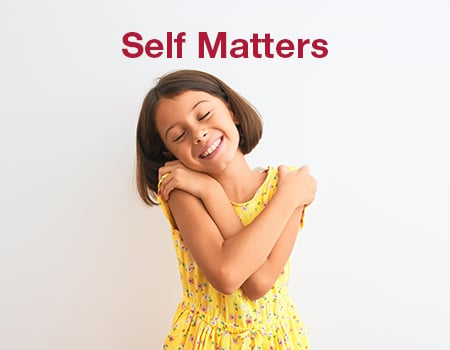We often hear the adage that we cannot love others if we do not love ourselves. Emergency instructions on airplanes advise us to put on our oxygen mask before attempting to help someone else, even our child. Self-love can be an elusive, nebulous thing. It may seem as attainable as winning the lottery or leaping over a tall building in a single bound. True, the road to self-love is a route rather than a destination. To walk the path requires commitment and diligence and patience which may feel like an oxymoron. The trajectory of self-love is self-compassion>self-acceptance>self-love>self-care.
We compare ourselves to others probably thousands of times a day. We deem ourselves superior to or inferior to others in countless areas—appearance, education, occupation, possessions, popularity, etc., etc., etc. When we make unhealthy comparisons of ourselves to others, we discount everyone. We send the message to ourselves that we are not okay as we are. We see ourselves and others as objects that either do or do not meet the ideal residing in our mind. This is not to say that healthy comparison has no place. It can urge us to acknowledge where in our life change would benefit us.
What is self-love?
Self-love is a state of being which encompasses every facet of our life and organically involves self-compassion and self-acceptance and leads to self-care. We treat ourselves with kindness. We claim our worth as a precious human being. We take care of our whole being—physical, mental, emotional, and spiritual. We believe in our ability to contribute to the life we want and the community in which we live. We find meaning in the people and activities that bring us joy and peace.
Self-love does not equal narcissism which commands us to see ourselves as elevated above others. Rather we view ourselves with honesty and offer ourselves validation for using our skills, whether innate or learned. We also see where in our life we want to create a new reality, a new perspective of our self.
While the elements of self-love may look like distinct steps or phases, they are active, fluid ways of being. We may be in different states at different times or we may inhabit several states at once in several areas of our lives or the same one. Let’s take a look at them and see how they are distinct and interrelated.
Self-compassion
The act of treating ourselves with kindness, gentleness, softness, and tenderness, especially when difficulty enters our life. We comfort and forgive ourselves in the moment as much as possible. We acknowledge that we may need to apologize, make an amend, or pay restitution. We see ourselves as a human being who makes mistakes, just as every human being does.
Self-compassion Journaling Exercise
- Think of an experience in which you said or did something you later regretted or a negative message you tell yourself. Allow your emotions to surface.
- Now, see yourself as a friend observing you. What kind words and gestures would your friend offer to you? “I know you are sorry for what you did. But this is not who you are. You made a mistake as we all do.” “Your experiences have left you with a distorted view of yourself. I see a delightful, smart, creative person who cares a lot about others.”
- Place your hand over your heart, close your eyes, take three deep breaths. When you are ready, open your eyes, open our journal, and pick up your pen.
- Now, write about the experience with eyes of gentleness, tenderness, and softness for yourself. Write soothing, comforting words to yourself.
- Then write about your new perspective and include your feelings toward yourself.
Self-acceptance
The ongoing process of recognizing we are neither good nor bad, but rather a mix of thoughts, beliefs, traits, and behaviors, some of which we like and others we do not. Together, they make up the whole of who we are as an individual unlike any other individual. Because we all are unique, there can be no comparisons. I will repeat that: Because we all are unique, there can be no comparisons. We step back and look at the whole quilt of our life and see how each experience contributed to our evolution and wisdom. So, we decide which beliefs and behaviors we can change, should we so choose, and which ones we can accept in peace.
- With the extension of self-compassion, you can now look closer at your humanity, your vulnerability as a human being. Try to view your mistake or message as a lesson to address. How did it, or the pattern it is part of, serve a need that damaged(s) your relationships with yourself and with other people.
- Write about the experience with the realization you did what you knew in the moment and the moment is now gone. What have you learned? What new information did you find out? What can you do now? What do you need or want?
- Write the prompt: I am at peace knowing I did my best at the time. I can practice a new approach for next time. Open your heart and your mind to self-forgiveness.
- Journal about the prompt as you allow this new understanding to seep into your being.
Self-love
As discussed above, self-love is composed of all the ways we treat ourselves with kindness, all the ways we find joy in ourselves, all the ways we feel and express gratitude for our being, all the ways we honor the gifts of our abilities. We pamper our bodies, our minds, our spirits. We integrate new activities and people into our lives who encourage and support us. We acknowledge the vagaries that make life a challenge and an adventure. We turn to our inner resources for guidance knowing we can enlist the support of others when needed.
Self-love Writing Exercise:
- Look at ways to integrate self-compassion and self-acceptance into your daily life.
- When facing difficult situations, remember to celebrate all that you are. Embrace the quirks that make you unique. Remember, all humans are alike, and every human is different.
- Write fully about your joys, your triumphs, your achievements, you innate Gifts, your goals, your ideas. Smile. Giggle. Laugh so hard your toes curl.
Self-care
When we love someone or something, we nurture it with sensitivity whether our family and friends or the houseplant someone threw out that we refuse to let die. We extend that care to ourselves. We take steps to make our environment—whether our home or the oceans and forests—an inviting and comfortable place to live. We learn what feels good and nourishes us and what brings us emotional pain. We seek out ways to enrich our lives by opening our minds to learning and to facing challenges with courage. We discern the difference between acting courageously and taking unnecessary risks.
Self-care writing exercise:
- Make lists of what makes you feel good, makes you happy, brings you peace, gives you senses of purpose and meaning, energizes you.
- Write about them, expanding on how they contribute to your sell-being.
Self-love is an ever-evolving process of experience and evaluation. Perfect does not exist here. We continue to learn. Although self-care is the final point on the trajectory, it is supported and propelled by self-love.
Breathe deeply. Be generous to yourself. Be kind to yourself. Keep writing.

Billie Wade, a lifelong journaler, believes people are precious, sacred, resilient, and stronger than they know. She created Journaling to Heal, LLC which helps people discover the power of writing in their process of recovery from emotional stress and trauma. Visit her at www.billiewade.com and find more of her writing on www.dmpcc.org/billie where she writes a monthly newsletter column for Des Moines Pastoral Counseling Center.



Leave Comment